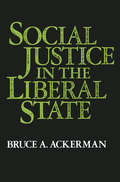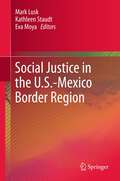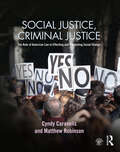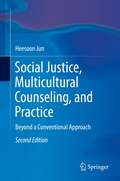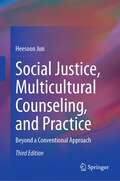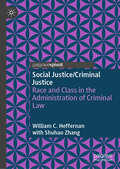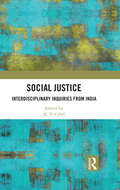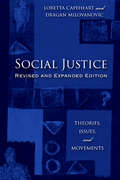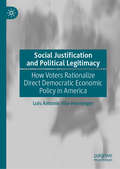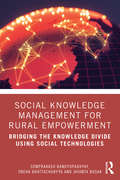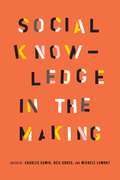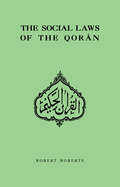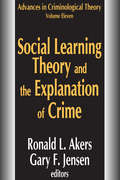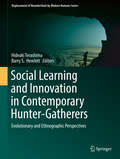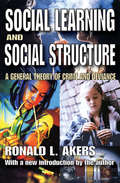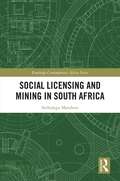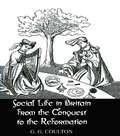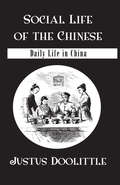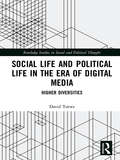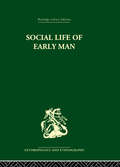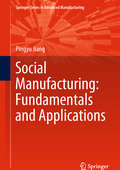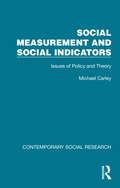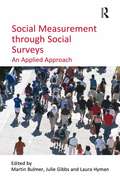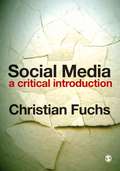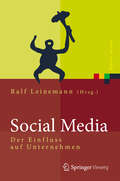- Table View
- List View
Social Justice in the Liberal State
by Bruce AckermanCertain to become the most important work in political theory since John Rawls's A Theory of Justice, this book presents a brilliantly original, compelling vision of a just society-a world in which each of us may live his own life in his own way without denying the same right to others. Full of provocative discussions of issues ranging from education to abortion, it makes fascinating reading for anyone concerned with the future of the liberal democratic state.
Social Justice in the U.S.-Mexico Border Region
by Kathleen Staudt Eva Moya Mark LuskThe U.S.-Mexico Border Region is among the poorest geographical areas in the United States. The region has been long characterized by dual development, poor infrastructure, weak schools, health disparities and low-wage employment. More recently, the region has been affected by the violence associated with a drug and crime war in Mexico. The premise of this book is that the U.S.-Mexico Border Region is subject to systematic oppression and that the so-called social pathologies that we see in the region are by-products of social and economic injustice in the form of labor exploitation, environmental racism, immigration militarism, institutional sexism and discrimination, health inequities, a political economy based on low-wage labor, and the globalization of labor and capital. The chapters address a variety of examples of injustice in the areas of environment, health disparity, migration unemployment, citizenship, women and gender violence, mental health, and drug violence. The book proposes a pathway to development.
Social Justice, Criminal Justice: The Role of American Law in Effecting and Preventing Social Change
by Cyndy Caravelis Matthew RobinsonSocial Justice, Criminal Justice is a thought-provoking examination of the U.S. legal system, focusing on how criminal justice and social justice are related. The book provides a solid foundation of key philosophical and theoretical issues and goes on to examine the function of the law as it relates to social justice issues. The authors present and explain the foundational legal documents of the United States, and critically examine how those same documents, which espoused the rhetoric of equality for all, contribute toward the perpetuation and maintenance of a system of exclusion for groups with minority status, such as racial and ethnic minorities, the poor, women, and the LGBT (lesbian, gay, bisexual, transgender) community. Succinct but comprehensive, this text offers a careful examination of possible relationships between social justice theory and criminal justice practice and illuminates the role that the legal system has played in both preventing and assisting social change and power dynamics. For each identified group, important landmark court decisions are used to demonstrate the plight of the powerless and the quest for equal rights. The book provides an important perspective and understanding of the relationships among criminal justice, social justice, and the law. Suitable for undergraduate and early graduate courses in Social Justice, Justice Studies, Critical Issues, Ethics, and American Government and Law, this text provides easily digestible content for those interested in thinking critically about the U.S. legal system.
Social Justice, Multicultural Counseling, and Practice: Beyond A Conventional Approach
by Heesoon JunThis second edition book provides an update to multicultural psychology and counseling research findings, and the DSM-5 in sociopolitical and cultural contexts. It links social psychology with current cognitive science research on implicit learning, ethnocentrism (attribution error, in-group favoritism, and asymmetric perception), automatic information processing, and inappropriate generalization. Chapters discuss the interwoven characteristics of multiple identities of individuals such as race, gender, class, disability, age, religion, region, and sexual orientation. In addition, the book offers concrete strategies to facilitate inner-dialogue and discussion of self-perception and interpersonal relationships. Featured topics in this book include: Intrapersonal communication and the biases that can be involved. The impact of a provider’s personal values and beliefs on assessing and treating clients. The Social Categorization Theory of Race. The Social Categorization Theory of Gender. The Social Dominance Theory of Class. Identity Construction, Multiple Identities, and their intersectionality. Social Justice, Multicultural Counseling, and Practice, Second Edition will be of interest to researchers and professors in clinical psychology, counseling psychology, multicultural psychology, social psychology, cognitive neuroscience, social work, social justice, equity, and inclusion work as well as health care providers.
Social Justice, Multicultural Counseling, and Practice: Beyond a Conventional Approach
by Heesoon JunThis third edition book offers a paradigm shift in thinking (from binary to complex) and enables visibility for the intersectionality of multiple identities that range from privileged to oppressed. For example, real people’s heterogeneous racial identities within the same racial group are visible. A paradigm shift in learning (from conceptual to transformative) connects conceptual learning (cognition) to their experience (affect). “…. transformation does not simply emerge due to the individual’s awareness…. but is experienced” (Benetka & Joerchel, 2016, p. 22). Uncensored first-person (subjective) written responses to specific questions to access unconscious and implicit bias will connect the writer’s experience to conceptual learning of diversity, equity, and inclusion. Writing in third person (objective) interrupts the transformative aspect by bypassing the accessibility of inner experience. Writing in first-person connects the writer to their experience which allows the unconscious to be accessed if it is practiced on a regular basis. This book is for everyone who wants to implement diversity, equity, and inclusion measures by learning to access their unconscious bias. Understanding social justice and equity and good intentions alone do not lead to accessing unconscious bias.
Social Justice/Criminal Justice: Race and Class in the Administration of Criminal Law
by William C. HeffernanThis book builds on Heffernan's last book Rights and Wrongs: Rethinking the Foundations of Criminal Justice by examining the class and racial disparities at the heart of current law — disparities that, according to many, generate a system of criminal injustice. It argues that these disparities run throughout the legal system; they’re present in policing, corrections, and sentencing. It discusses the relationship between the two kinds of justice — social justice and criminal justice and how to ensure fairness in state-imposed punishment. It theorises the extent to which criminal law must address considerations of social justice to ensure a fair system. It proposes a framework for analyzing disparities, provides an overview of contemporary research concerning them, and offers reform proposals for addressing them. Written in an accessible way, it introduces readers to philosophical theory and doctrines in constitutional law and thus it speaks to a wide audience concerned about racial and class disparities in the criminal justice system. It responds to a half-century’s worth of public concern about the legitimacy of the state’s exercise of its penal power while explaining the pertinence of social justice principles to the criminal justice system.
Social Justice: Interdisciplinary Inquiries from India
by K. V. CybilThis book explores the political and philosophical underpinnings of exclusion and social injustice in India. It examines social movements, anti-caste uprisings, reformers like Ambedkar and Narayana Guru and writers like Foucault and Serres to establish a link between the political and social milieu of the idea of nationhood. Going beyond the legal framework of justice, the essays in the volume reassemble the social from popular perception and the margins, and challenge Rawlsian and Eurocentric paradigms which have dominated discourse on social injustice. The volume also draws on instances of history as well as contemporary issues, as well as locating them in the context of social and post-colonial theory. An intellectually stimulating yet subaltern engagement with the idea of justice, the volume will be of great interest to scholars and researchers of social theory, law, modern South Asian history and social exclusion and discrimination studies.
Social Justice: Theories, Issues, and Movements (Revised and Expanded Edition) (Critical Issues in Crime and Society)
by Dragan Milovanovic Loretta CapeheartAn eye for an eye, the balance of the scales – for centuries, these and other traditional concepts exemplified the public’s perception of justice. Today, popular culture, including television shows like Law and Order, informs the public’s vision. But do age-old symbols, portrayals in the media, and existing systems truly represent justice in all of its nuanced forms, or do we need to think beyond these notions? The second edition of Social Justice: Theories, Issues, and Movements responds to the need for a comprehensive introduction to these issues. Theories of social justice are presented in an accessible fashion to encourage engagement of students, activists, and scholars with these important lines of inquiry. Issues are analyzed utilizing various theories for furthering engagement in possibilities. Struggles for justice -- from legal cases to on the ground movements -- are presented for historical context and to inform the way forward.
Social Justification and Political Legitimacy: How Voters Rationalize Direct Democratic Economic Policy in America
by Luis Antonio Vila-HenningerThis volume explores voters’ political rationalizations. The author analyzes semi-structured interview data from 120 American voters collected from 2013-2015 about their positions on three economic referenda—or “direct democratic economic policies” (DDEPs) on the Arizona state ballot from 2008-2012. Building on the literature on voter reasoning and rationalization, the author firstly probes how the intersection of economic position and partisan affiliation shape partisan voters’ rationalizations of their DDEP positions. Secondly, he investigates the political and economic discourses that voters use to justify their DDEP positions. This book extends classic sociological theories of individual-level and collective legitimacy, along with contemporary theories of voter rationalization. The findings also help to build theories of American political ideology and values, neoliberalism, moral economy, and norms of self-interest.
Social Knowledge Management for Rural Empowerment: Bridging the Knowledge Divide Using Social Technologies
by Somprakash Bandyopadhyay Sneha Bhattacharyya Jayanta BasakThis book develops and examines the concepts and strategies for rural empowerment through the formation of a community-driven social knowledge management (SKM) framework aided by social technology. The framework is aimed at mobilizing knowledge resources to bridge the rural–urban knowledge divide while securing rural empowerment using digital connections and social collaborations built on strategies of self-sustenance and self-development. With key empirical findings supplemented by relevant theoretical structures, case studies, illustrative figures and a lucid style, the book combines social technologies and social development to derive a social knowledge management platform. It shows how the proposed SKM framework can enhance knowledge capabilities of rural actors by facilitating connection among rural–urban entities through formation of purposive virtual communities, which allow social agents to create, modify and share content collaboratively. The volume brings forward diverse issues such as conceptual foundations; bridging the rural–urban knowledge and information divide; issues of information and knowledge asymmetry; a knowledge-theoretic perspective of rural empowerment; knowledge capability, freedom of choice and wellbeing, to provide a comprehensive outlook on building a knowledge society through digital empowerment. This book will be useful to scholars and researchers of development studies, rural sociology, management studies, IT/IS, knowledge management and ICT for development, public policy, sociology, political economy and development economics. It will benefit professionals and policymakers, government and nongovernment bodies and international agencies involved with policy decisions related to application of technologies for rural development, social workers and those in the development sector.
Social Knowledge in the Making
by Michèle Lamont Neil Gross Charles CamicOver the past quarter century, researchers have successfully explored the inner workings of the physical and biological sciences using a variety of social and historical lenses. Inspired by these advances, the contributors to Social Knowledge in the Making turn their attention to the social sciences, broadly construed. The result is the first comprehensive effort to study and understand the day-to-day activities involved in the creation of social-scientific and related forms of knowledge about the social world. The essays collected here tackle a range of previously unexplored questions about the practices involved in the production, assessment, and use of diverse forms of social knowledge. A stellar cast of multidisciplinary scholars addresses topics such as the changing practices of historical research, anthropological data collection, library usage, peer review, and institutional review boards. Turning to the world beyond the academy, other essays focus on global banks, survey research organizations, and national security and economic policy makers. Social Knowledge in the Making is a landmark volume for a new field of inquiry, and the bold new research agenda it proposes will be welcomed in the social science, the humanities, and a broad range of nonacademic settings.
Social Laws Of The Qoran
by Robert RobertsFirst published in 1925, this book looks at the social laws of the Quran which have been considered and compared with those of the Hebrew and other ancient codes. This is the author’s translation from German to English.
Social Learning Theory and the Explanation of Crime: A Guide For The New Century (Advances in Criminological Theory)
by Ronald L. Akers Gary F. JensenSocial learning theory has been called the dominant theory of crime and delinquency in the United States, yet it is often misrepresented. This latest volume in the distinguished Advances in Criminological Theory series explores the impact of this theory. Some equate it with differential association theory. Others depict it as little more than a micro-level appendage to cultural deviance theories. There have been earlier attempts to clarify the theory's unique features in comparison to other theories, and others have applied it to broader issues. These efforts are extended in this volume, which focuses on developing, applying, and testing the theory on a variety of criminal and delinquent behavior. It applies the theory to treatment and prevention, moving social learning into a global context for the twenty-first century.This comprehensive volume includes the latest work, tests, and theoretical advances in social learning theory and will be particularly helpful to criminologists, sociologists, and psychologists. It may also be of interest to those concerned with current issues relating to delinquency, drug use/abuse, and drinking/alcohol abuse.
Social Learning and Innovation in Contemporary Hunter-Gatherers: Evolutionary and Ethnographic Perspectives (Replacement of Neanderthals by Modern Humans Series)
by Hideaki Terashima Barry S. HewlettThis is the first book to examine social learning and innovation in hunter–gatherers from around the world. More is known about social learning in chimpanzees and nonhuman primates than is known about social learning in hunter–gatherers, a way of life that characterized most of human history. The book describes diverse patterns of learning and teaching behaviors in contemporary hunter–gatherers from the perspectives of cultural anthropology, ecological anthropology, biological anthropology, and developmental psychology. The book addresses several theoretical issues including the learning hypothesis which suggests that the fate of Homo sapiens and Neanderthals in the last glacial period might have been due to the differences in learning ability. It has been unequivocally claimed that social learning is intrinsically important for human beings; however, the characteristics of human learning remain under a dense fog despite innumerable studies with children from urban–industrial cultures. Controversy continues on problems such as: do hunter–gatherers teach? If so, what types of teaching occur, who does it, how often, under what contexts, and so on. The book explores the most basic and intrinsic aspects of social learning as well as the foundation of innovative activities in everyday activities of contemporary hunter–gatherer people across the earth. The book examines how hunter-gatherer core values, such as gender and age egalitarianism and extensive sharing of food and childcare are transmitted and acquired by children. Chapters are grouped into five sections: 1) theoretical perspectives of learning in hunter–gatherers, 2) modes and processes of social learning in hunter–gatherers, 3) innovation and cumulative culture, 4) play and other cultural contexts of social learning and innovation, 5) biological contexts of learning and innovation. Ideas and concepts based on the data gathered through an intensive fieldwork by the authors will give much insight into the mechanisms and meanings of learning and education in modern humans.
Social Learning and Social Structure: A General Theory of Crime and Deviance
by Ronald AkersThe social learning theory of crime integrates Edwin H. Sutherland's diff erential association theory with behavioral learning theory. It is a widely accepted and applied approaches to criminal and deviant behavior. However, it is also widely misinterpreted, misstated, and misapplied.This is the fi rst single volume, in-depth, authoritative discussion of the background, concepts, development, modifications, and empirical tests of social learning theory. Akers begins with a personal account of Sutherland's involvement in criminology and the origins of his infl uential perspective. He then traces the intellectual history of Sutherland's theory as well as social learning theory, providing a comprehensive explanation of how each theory approaches illegal behavior. Akers reviews research on various correlates and predictors of crime and delinquency that may be used as operational measures of differential association, reinforcement, and other social learning concepts.Akers proposes a new, integrated theory of social learning and social structure that links group diff erences in crime to individual conduct. He concludes with a cogent discussion of the implications of social learning theory for criminology and public policy. Now available in paperback, with a new introduction by the author, this volume will be invaluable to professionals and for use in courses in criminology and deviance.
Social Licensing and Mining in South Africa (Routledge Contemporary Africa)
by Sethulego MatebesiThis book highlights the role of community trusts in social licencing through the lens of mining and mining disputes in South Africa. Employing elements of trust, acceptance and elite interaction as a framework, this book critically investigates the underlying dynamics of community development trusts and also the response of host communities to the inherent dilemma of the SLO concept, namely social legitimation versus corporate profits. Looking at formal versus informal regulatory requirements, popular mobilisation, and the interaction between the local population and mining companies, this book constitutes a thorough look at the issues surrounding mining in South Africa and its effect on society. This book will be of interest to students and scholars of African studies, business in Africa, corporate responsibility, and development studies.
Social Life In Britain: From The Conquest To The Reformation (classic Reprint)
by CoultonFirst published in 2005. Routledge is an imprint of Taylor & Francis, an informa company.
Social Life Of The Chinese: With Some Account Of The Religious, Governmental, Educational, And Business Customs And Opinions. With Special But Not Exclusive Reference To Fuchchau
by DoolittleFirst Published in 2005. Routledge is an imprint of Taylor & Francis, an informa company.
Social Life and Political Life in the Era of Digital Media: Higher Diversities (Routledge Studies in Social and Political Thought)
by David ToewsDigital technology has vastly broadened and complexified social life, levelling opportunities for communication and producing a new awareness of the importance of diversity of social relations, as well as of life on the planet. This book explores the ways in which social media, by encouraging human curiosity and sociability in relation to these developments, has highlighted for users their own nature as social beings who have discovered new ways to get along with each other, as well as new challenges. The complexity of networks on social media has created new kinds of conflicts, and new ways to mediate older kinds of conflicts, that have resulted in a demand for new forms of political participation, thus reinvigorating political activity, without extending the practice of ‘politics as usual’. However, with concerns for the planet in the back- ground, a tendency for elites and ordinary people alike to want to see a political solution to every problem in social life has become an unsustainable and troubling trend. This book argues that enthusiasms for social media can be tempered in a helpful manner through an engagement with studies of social media in relation to understandings of the history of modern social life provided by sources in classical and contemporary sociology and political theory. Social media makes possible new sociable opportunities and multiple publics, but at the same time represents important continuities with modern social life of earlier times, such as the respect in which it works to limit political action within the boundaries of a generalized public, thus constraining demagoguery and challenging the arrogance of elites who seek to impose certain forms of political life. Engaging with the work of Deleuze, Tarde, Simmel, Lazzarato, Latour, Harman, Heidegger, Arendt, Archer, Wellman, Bergson and others, Social Life and Political Life in the Era of Digital Media advances a new understanding of modernity offered by social media, re-establishing the autonomy of social life over and against political life and re-articulating the relationship between the social and political. As such, it will appeal to scholars of social and political theory and cultural and media studies.
Social Life of Early Man (Viking Fund Publications In Anthropology #No. 31)
by Sherwood L WashburnAttempting to reconstruct the life of early societies, particular emphasis is laid upon social behaviour among primates, as well as approaches from ethnology, prehistoric archaeology, geography, genetics, human stress biology and psychology. First published in 1962.
Social Manufacturing: Fundamentals and Applications (Springer Series in Advanced Manufacturing)
by Pingyu JiangThis book introduces social manufacturing, the next generation manufacturing paradigm that covers product life cycle activities that deal with Internet-based organizational and interactive mechanisms under the context of socio-technical systems in the fields of industrial and production engineering. Like its subject, the book's approach is multi-disciplinary, including manufacturing systems, operations management, computational social sciences and information systems applications. It reports on the latest research findings regarding the social manufacturing paradigm, the architecture, configuration and execution of social manufacturing systems and more. Further, it describes the individual technologies enabled by social manufacturing for each topic, supported by case studies. The technologies discussed include manufacturing resource minimalization and their socialized reorganizations, blockchain models in cybersecurity, computing and decision-making, social business relationships and organizational networks, open product design, social sensors and extended cyber-physical systems, and social factory and inter-connections. This book helps engineers and managers in industry to practice social manufacturing, as well as offering a systematic reference resource for researchers in manufacturing. Students also benefit from the detailed discussions of the latest research and technologies that will have been put into practice by the time they graduate.
Social Measurement and Social Indicators: Issues of Policy and Theory (Contemporary Social Research)
by Michael CarleyFor the early pioneers of the social indicator movement, the possibilities of doing social good by developing the tools of social measurement seemed endless. However, in the early 1980s these high, and perhaps naïve, hopes remained unfulfilled, especially for the data needs of the policy-maker. If not pessimistic, administrators and public policy-makers were at least guarded about the usefulness of social indicators as an aid to increasingly complex decision-making.These difficulties reflected both policy-related and methodological issues. Originally published in 1981, Social Measurement and Social Indicators is not a ‘how-to’ guide on the construction of social indicators, but rather a critical and optimistic view of these central issues, as embodied in the literature and in practice at the time. Michael Carley contrasts some of the basic problems of social measurement with government’s needs for reliable information, organised by their policy usefulness and statistical sophistication.The book then discusses the critical relationship between social indicators and social theories and models, as well as the role of social information in the policy process. Later chapters look at the audience, the problems, and the prospects for national social reports; and explore in detail three different applications of social indicators to urban analysis. Throughout the book helpful examples are drawn from North American, UK and European experience.Social Measurement and Social Indicators is aimed at a cross-disciplinary audience in government and the universities. For students, it will serve as a compact introduction to the broad field of social indicators; for administrators, it explores philosophical and measurement problems and suggests criteria for interpretation; for researchers, it places social indicator efforts into a wider policy analysis perspective – with its inescapable political value judgemental, and bureaucratic aspects.
Social Measurement through Social Surveys: An Applied Approach
by Julie GibbsHow do academic social scientists and survey professionals use social measurement techniques? How are these techniques applied to specific concepts in empirical research? This book is an important resource for students, academic and professional researchers, offering an overview of both new and practiced methods of social measurement for quantitative survey research. It will provide readers looking to investigate "hot" social science topics with a way of learning how key measurement techniques can be utilised in that topic in a practical way. Emerging from the editors' widely used work on an online social survey resource offering information on key social surveys and their questionnaires entitled ’Question Bank’, this book aims to take this material further. It elaborates on the problems involved with this resource type, providing a comprehensive and unique volume that will enable the reader to have the confidence to use this technique in their own research.
Social Media
by Christian FuchsNow more than ever, we need to understand social media - the good as well as the bad. We need critical knowledge that helps us to navigate the controversies and contradictions of this complex digital media landscape. Only then can we make informed judgements about what's happening in our media world, and why. Showing the reader how to ask the right kinds of questions about social media, Christian Fuchs takes us on a journey across social media, delving deep into case studies on Google, Facebook, Twitter, WikiLeaks and Wikipedia. The result lays bare the structures and power relations at the heart of our media landscape. This book is the essential, critical guide for all students of media studies and sociology. Readers will never look at social media the same way again.
Social Media
by Ralf LeinemannDie Beiträge aus unterschiedlichen Unternehmen bieten eine fundierte Darstellung zum Einfluss sozialer Medien (Facebook, Twitter, LinkedIn, Xing, etc) auf die Kommunikation und Aussendarstellung von Unternehmen sowie auf interne Prozesse. Die Autoren erläutern zunächst den Einfluss auf interne und externe Kommunikation, die Kommunikationsqualität in sozialen Medien und die Chancen und Risiken der neuen Medien. Die Einflüsse auf die verschiedenen Unternehmensbereiche werden aus der Praxis heraus diskutiert. Zu den adressierten Bereichen gehören die Auswirkungen auf PR und Analyst Relations sowie auf Kommunikation und IT-Infrastruktur. In zwei abschließenden Kapiteln werden auch einzelne Branchen beleuchtet und ein internationaler Vergleich vorgestellt.
